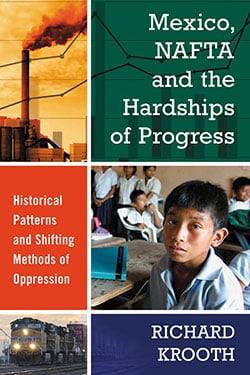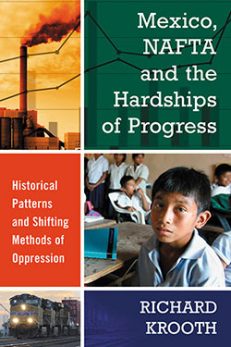Mexico, NAFTA and the Hardships of Progress
Historical Patterns and Shifting Methods of Oppression
$29.95
In stock
About the Book
Since the 16th century, Mexico has in many ways been held captive by outsiders. In the modern era, outsiders have most often made their impact through control of the Mexican economy and helping to establish a ruling elite while millions of ordinary citizens face abject poverty. With the advent of the North American Free Trade Agreement (NAFTA), Mexico’s leadership predicted a new wave of economic progress in the country. However, a devaluation of the peso showed that the Mexican economy was as problematical as before. This work first examines the sociopolitical history of the country, and how the events of the past continue to influence the government’s policies. Mexico’s post–NAFTA future is then explored, with particular emphasis placed on how economic policy could evolve in a period of free trade. A 2013 postscript concludes the work.
About the Author(s)
Bibliographic Details
Richard Krooth
Format: softcover (6 x 9)
Pages: 396
Bibliographic Info: notes, bibliography, index
Copyright Date: 2013 [1995]
pISBN: 978-0-7864-7605-3
eISBN: 978-1-4766-0597-5
Imprint: McFarland
Table of Contents
Preface vii
Introduction 1
Part I • A Portrait of Mexico Past& 21
1 From Inquisition to Independence 23
2 From Empire to the War of Reform 57
Part II • Return to the Past& 73
3 Revolution, Independence, and Imperial Impositions 74
Part III • Looking Forward: Old Ways, New Means& 111
4 Nationalism, Development, and Foreign Influence in the Late 1920s and the 1930s 113
5 Nationalism and Industrial Reform in the 1930s 137
6 Nationalization and Imperial Oil 146
7 A Historic Breakthrough 156
Part IV • From the Status Quo Ante to the Policy of Progress& 165
8 Mexico’s Historic Transformation 169
9 The Policy of Progress
I: The Lost Half-Century, 1940–94 186
10 The Policy of Progress
II: Reconquest and Proletarianization of the Land 200
Part V • From the Old Status Quo to a New Order& 217
11 Domestic Reorganization and the Emergent Zone of Influence 222
12 Free Trade and the Great U.S. Transformation 233
13 NAFTA: A Divisive Pact 249
14 The New Sphere of Influence 264
15 Political Boundaries, Unified Economy, and Maquiladoras 277
16 In the Domain of Each Nation 290
Part VI • Steps to Mexico’s Future 305
17 Democracy Led by a Few: Government Frame for the New Order 311
18 The War on Civil Society 324
19 Mexico in the Twenty-first Century 328
Postscript (2013) 335
Notes 341
Bibliography 367
Index 381
Book Reviews & Awards
“a very useful discussion and history of capital and labor relations in the two countries”—Choice.





